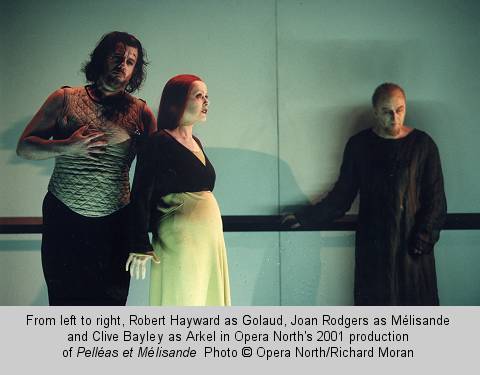|
<< -- 3 -- Wilfrid Mellers SECOND SIGHT

The singing, too, is more than adequate, with June Rodgers' Mélisande
and William Dazeley's Pelléas imbuing the shilly-shallyings of these
blighted beings with intimations of the fairytale prince and princess they
might have blossomed into, but for the grim reality of Golaud's self-tormentings
which, as presented by Robert Haywood, earn a measure of respect, at least
until, at Mélisande's death-scene, he bluntly protests that it was
in no way his fault -- at which our hackles belatedly rise, like quills
upon the fretful porpentine. Those Opera North stalwarts, Frances MaCafferty
as Genéviève and Clive Bayley as Arkel, are as trustworthy
as always, and Bayley even succeeds in making the tottery Arkel a frail
yardstick of human values in a world of blind folk in a black forest. Thomas
Lewis, as (not so) 'little Yniald', proves equal to his role in the tremendous
scene when Golaud forces him to spy on the young lovers: when, of course,
he fails to see the nothing there is to see.

As so often with modern opera productions the direction, by Richard Jones,
and the sets by Anthony Macdonald, slightly distress viewers as old as I
am: I can't see that the four closed doors in an empty corridor which are
the first we see make an apter image of our 'lost' state than does Debussy's
Dark Forest; and although some of the expressionistically geometric designs,
such as the sea-cavern, are startlingly beautiful, the empty white cubicles
that serve as the palace apartments lack spiritual resonance. But perhaps
their white emptiness in a dark world is the point; and certainly the final
scene, in which Mélisande is confronted on her death-bed with Golaud's
bullying importunacy, proved painfully moving. That Mélisande dies
without having revealed 'la vérité' would seem to be the heart
of the human predicament: which has neither physical consummation nor metaphysical
consolation, only an intense capacity to feel and a quasi-oriental acceptance
of the unknowable mysteries of life, suffering, and death.
Continue >>
Copyright © 20 January 2001
Wilfrid Mellers, York, UK
 << Music
& Vision home Recent reviews
Alfred Schnittke >>
<< Music
& Vision home Recent reviews
Alfred Schnittke >>
|

